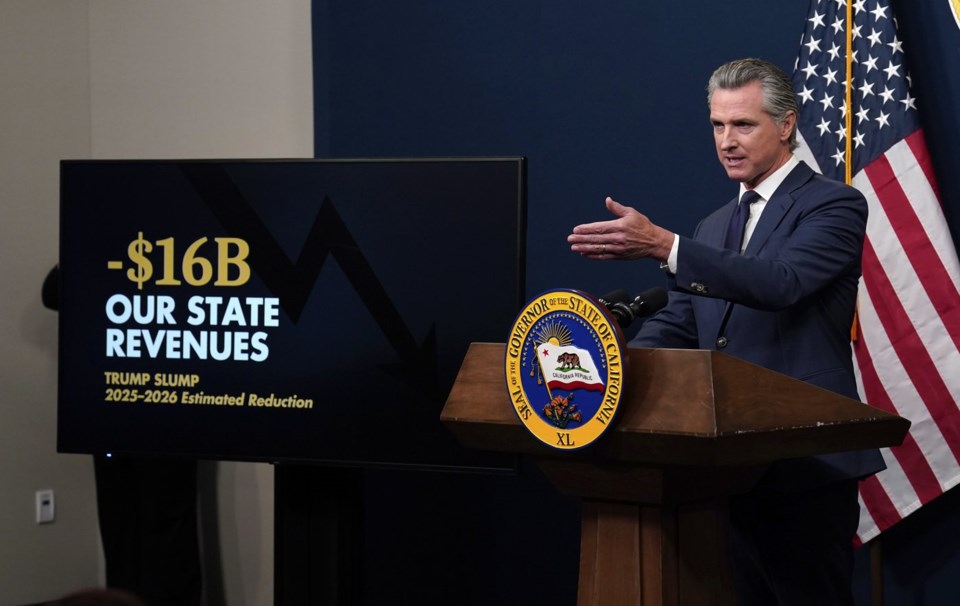SACRAMENTO, Calif. (AP) ā California is facing a $12 billion deficit that Gov. Gavin ¾¢±¬“ó¹Ļom wants to help close by freezing enrollment in a state-funded health care program for immigrants living in California without legal status.
¾¢±¬“ó¹Ļom announced the deficit and his plans to cover it Wednesday as he outlined his nearly $322 billion state spending plan for the upcoming fiscal year.
Beyond higher-than-expected Medicaid spending, ¾¢±¬“ó¹Ļom said the deficit is due to broad economic uncertainty, including ever-changing federal tariff policies and a volatile stock market. California relies heavily on revenue from a tax on capital gains.
¾¢±¬“ó¹Ļom, a Democrat, kicked off his budget presentation by highlighting California's contributions to the U.S. and world economy and blaming President Donald Trump's economic policies, which he said could reduce state revenues by $16 billion in the coming years.
āCalifornia is under assault,ā he said. āWe have a president that's been reckless in terms of assaulting those growth engines.ā
He now opens budget negotiations with lawmakers and itās unclear how Democrats who control the Legislature will react to his plan to freeze new Medi-Cal enrollment for some immigrants. A final budget proposal must be signed by June. Californiaās budget is by far the largest among states.
A freeze on immigrant health care
His decision highlights ¾¢±¬“ó¹Ļom's struggle to protect his liberal policy priorities against budget challenges in his final years on the job and as he weighs his next political move, which could include a presidential run.
Immigration has become a politically potent issue nationally. Nearly half of Americans approve of President Donald Trumpās tougher immigration approach, according to an conducted in April. Meanwhile, Republicans in Congress have for states that enroll immigrants living in the country illegally.
The freeze does not mean California is backing away from its support for immigrants, ¾¢±¬“ó¹Ļom said.
āNo state has done more than the state of California, no state will continue to do more than the state of California by a long shot. And thatās a point of pride,ā he said.
California was among one of the first states to all poor adults regardless of their immigration status last year, an ambitious plan touted by ¾¢±¬“ó¹Ļom to help the nationās most populous state inch closer to a goal of universal health care. But the cost ran $2.7 billion more than the administration had anticipated.
¾¢±¬“ó¹Ļom in March suggested he was not considering rolling back health benefits for immigrants as the state was grappling with . He also repeatedly defended the expansion, saying it saves the state money in the long run. The program is state-funded and does not use federal dollars.
Under ¾¢±¬“ó¹Ļom's plan, low-income adults without legal status will no longer be eligible to apply for Medi-Cal, the state's Medicaid program, starting in 2026. Those who are already enrolled won't be kicked off their plans, and the changes won't impact children. ¾¢±¬“ó¹Ļom didn't say how long the freeze would last.
Starting in 2027, adults with āunsatisfactory immigration statusā on Medi-Cal will also have to pay a $100 monthly premium. The governor's office said that is in line with the average cost paid by those who are on subsidized heath plans through California's own marketplace. There's no premium for most people currently on Medi-Cal.
āWe believe that people should have some skin in the game as it relates to contributions," ¾¢±¬“ó¹Ļom said.
¾¢±¬“ó¹Ļom's office estimated the changes will save the state $5.4 billion by 2028-2029.
The Medi-Cal expansion, combined with other factors such as rising pharmacy costs and larger enrollment by older people, has forced California to borrow and to plug the multibillion hole earlier this year. California provides free health care to more than a third of its 39 million people.
¾¢±¬“ó¹Ļom's proposals go against the commitment the state has made to the immigrant community, said Masih Fouladi, executive director of the California Immigrant Policy Center.
āQuestions about the practicality of the program aren't even something that we want to entertain with,ā he said. āThe proposal just doesn't match with our values as a state.ā
¾¢±¬“ó¹Ļom also proposed eliminating state health care coverage for certain weight loss drugs beginning in January 2026, which would save an estimated $85 million for the upcoming fiscal year and $680 million by fiscal year 2028-29.
Environmental spending
¾¢±¬“ó¹Ļom wants to reauthorize the state's cap-and-trade program through 2045. The program aims to reduce emissions from industrial sources over time through market-based mechanisms, and its set to expire in 2030.
Money generated through auctions of credits needed to pollute goes into a fund that lawmakers tap for climate-related spending and the state's high-speed rail project.
¾¢±¬“ó¹Ļom proposed tapping $1.5 billion from that fund for the state fire department. He said the shift would help ensure carbon emitters help fund the stateās response to fires intensified by climate change.
His proposal would also ensure $1 billion annually for the stateās long-delayed high-speed rail project. The project now receives 25% of Greenhouse Gas Reduction Fund money, which ends up being a little more or a little less than a billion annually depending on the year.
___
Associated Press journalist Sophie Austen contributed.
TrĆ¢n Nguyį» n, The Associated Press




